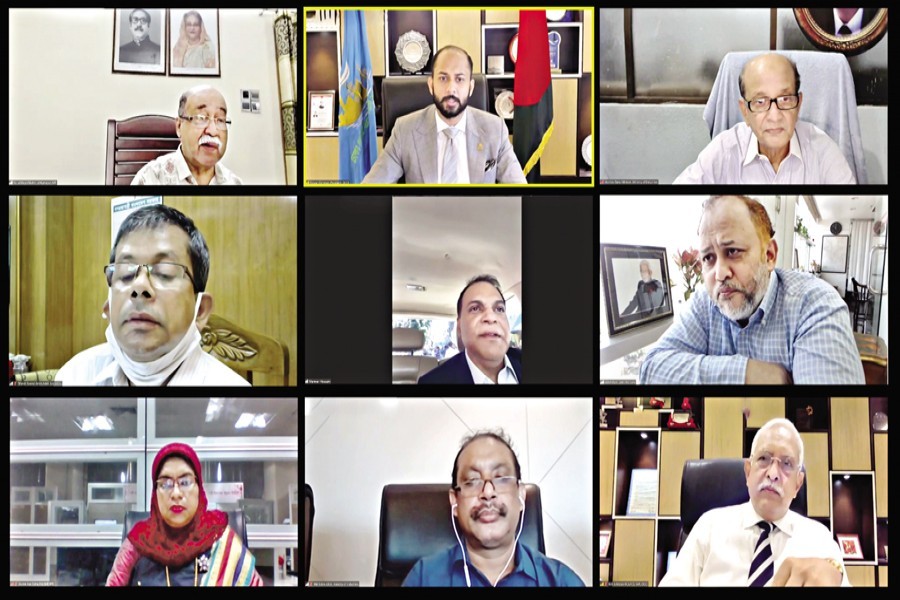Experts at a virtual dialogue on Sunday emphasised the need for redefining SMEs and startups in the proposed National Industrial Policy to ensure adequate financing - to have a vibrant private sector in the country and to get ready to face challenges of post-LDC era.
They said product diversification, skill development, policy reforms, private sector-led economic transformation, technology adaptation, adequate training, and SME development are some of the areas that the industrial policy should focus on to help compete in the international market even after the LDC graduation.
Speakers also emphasised protecting domestic market, facilitating import-substitute industries, cluster development, and participation of women entrepreneurs to make the policy up to date as per the demands of the Fourth Industrial Revolution (4IR).
They made these remarks at the webinar - 'Private Sector Expectation in the Proposed National Industrial Policy 2021' - organised by the Dhaka Chamber of Commerce and Industry (DCCI).
DCCI President Rizwan Rahman, in his opening remarks, urged the government to redefine the definition of SMEs to ensure adequate access to finance and policy support to the small and cottage industries. Besides, the moratorium period for SME loans should be extended.
He also suggested that Bangladesh can follow the example of Vietnam to prepare a comprehensive industrial policy.
Mr Rahman opined that research and development, innovation and e-commerce can play a vital role in future, and the government should address these sectors properly in the policy.
The DCCI president also mentioned that after the LDC graduation Bangladesh would have to face competition in the global export market due to lack of product diversification.
"In this regard, signing free trade agreements (FTAs) with potential countries and enhancing trade negotiation skills of the country are very crucial," he added.
Echoing the same, Husne Ara Shikha, general manager, SMESPD - the Bangladesh Bank (BB), said specific definitions of cluster and startup should be provided in the industrial policy.
"Micro merchants sho-uld also be included in the service industry sector. Industry sector's contribution to the country's GDP is 35 per cent, of which only 9.0 per cent comes from large industries, and the rest comes from SMEs."
She suggested including trading in the industrial policy, adding that the BB has been facilitating women entrepreneurs at its best capacity with best possible policy assistance.
Speaking as the chief guest, Industries Minister Nurul Majid Mahmud Humayun said the country would be able to take contribution of industry sector to the GDP to 40 per cent.
"SMEs are the lifeline of our economy, and they should get maximum facility either in fiscal or non-fiscal format."
"Coordinated efforts of public and private sectors to create employment opportunities, establishing skilled backward and forward linkage industries, and expansion of domestic industries are important."
He also said the government is planning to create skilled human resources in the ICT sector to reap benefits of the 4IR.
Synchronised efforts are needed to properly implement one stop service of the Bangladesh Investment Development Authority (BIDA), the minister concluded.
State Minister for Industries Kamal Ahmed Majumder said protection of domestic industries, IPR management, cluster-based industrial parks, sustainable industrialisation and necessary policy reforms would be considered for the next industrial policy, as these are the keys to boost local and foreign investments in the country.
Md Salim Ullah, senior assistant secretary (policy) of the Ministry of Industries, presented the keynote paper.
He said the industrial policy would focus on increasing the contribution of industrial sector to the GDP from 35 per cent to 40 per cent as well as reducing poverty and unemployment by creating skilled human resources for the sector.
ASM Mainuddin Monem, Managing Director of Abdul Monem Limited, urged for aggressive product diversification and technological advancement.
After the LDC graduation, cost of production would increase. So, the issue has to be addressed.
The country's land policy is not friendly enough, Mr Monem noted, and urged for reforming it - especially for economic zones (EZs).
Besides, a target-oriented, time-bound EZ management policy is necessary.
He further requested the government to finalise at least 10 EZs with focused fiscal incentives, quick infrastructure development, and utility connections.
Manwar Hossain, Group Managing Director - Anwar Group of Industries, said the industrial policy should focus not only on overall industrialisation, but on every individual industrialist or manufacturer.
"Stability of policies is very much needed to progress. We should focus on (sectors), where we have strengths."
"If we arrange skill development measures and training for migrant workers, they will have more capacity to contribute to the national economy," he added.


